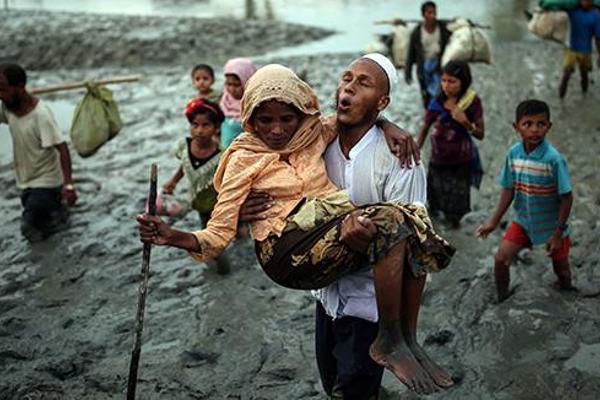UN says 270,000 Rohingya fled Myanmar in past two weeks
MOSCOW/WASHINGTON


The new figure confirmed by U.N. Refugee Agency spokeswoman Vivian Tan is much higher than the 164,000 the agency had previously estimated had arrived since Aug. 25.
"This is an alarming number," Tan said. "The existing camps are full to the capacity. There is a lot of pressure on relief agencies to accommodate the rising numbers."
She said the new number was still a "rough estimate," and based on an assessment that involved a host of aid agencies operating in the area. Some aid groups also had identified "new pockets of people that we did not know about before, mainly in villages" where Bangladeshi communities had taken them in, but also some new settlements and clusters in difficult-to-access areas.
Makeshift camps were quickly appearing and expanding along roadsides, Tan said.
She said it was possible some people who received help from multiple agencies could have been counted twice.
The exodus from Myanmar's northern Rakhine state began Aug. 25 and it's not known how many Rohingya remain there. Previously the population had been thought to be roughly 1 million.
The Rohingya have long been subjected to discrimination in mostly Buddhist Myanmar, which regards them as illegal immigrants from Bangladesh and denies them citizenship even if they have lived in the country for generations.
Dozens of Rohingya have died in capsizings since the exodus began, and there are other dangers as well.
Land mines were planted years ago along parts of the border. Bangladeshi officials say Myanmar soldiers have planted new explosives since the latest wave of violence began, though the Myanmar military denies it.
Moreover, a senior U.N. representative told AFP that more than 1,000 people may already have been killed in Myanmar, mostly Rohingya Muslims.
On the basis of witness testimonies and the pattern of previous outbreaks of violence, said Yanghee Lee, the U.N. special rapporteur on human rights in Myanmar, “perhaps about a thousand or more are already dead.”
“This might be from both sides but it would be heavily concentrated on the Rohingya population.”
Myanmar’s Nobel Peace Prize winner Aung San Suu Kyi, who spent years under house arrest when Myanmar was a military dictatorship, is now the country’s de facto leader with the title of State Counsellor.
She has faced criticism for failing to condemn the violence, leaving her global reputation in tatters.
Earlier this week Suu Kyi, 72, condemned a “huge iceberg of misinformation” on the crisis, without mentioning the Rohingya flocking to Bangladesh.
On Sept. 7 she told Indian news agency ANI the situation in Rakhine was “one of the biggest challenges that we’ve had to face.”
“I think it is a little unreasonable to expect us to resolve everything in 18 months,” she added.
President Recep Tayyip Erdoğan, meanwhile, said on Sept. 8 that amid continued aid distribution, Turkey aims to build more livable camps for Rohingya Muslims.
Erdoğan said Ankara has been continuing multilateral diplomacy to find a sustainable solution to the Rohingya crisis in Myanmar, adding that the current tent camps in Bangladesh are not livable.
Turkey could share its know-how building camps with better facilities as the country has hosted around 3 million Syrian refugees for over six years, he also said.
“If Bangladesh authorities allocate an area, we want to build more livable tent camps [for Rohingya refugees] using our experience,” he told reporters at Istanbul’s Atatürk International Airport before leaving for Kazakhstan, adding that Turkey’s intensive efforts have started to bear fruit as the Turkish Cooperation and Coordination Agency (TİKA) was allowed to distribute food and clothing in Rakhine state, hours after Erdoğan’s telephone call with Suu Kyi.
“TİKA has distributed 1,000 tons of humanitarian aid. In the second phase, we are planning to distribute 10,000 tons of food, medicine and clothes,” he said, while also adding that so far he has spoken with some 20 leaders from across the world.
